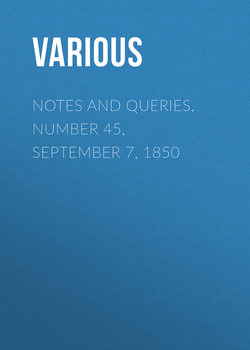Читать книгу Notes and Queries, Number 45, September 7, 1850 - Various - Страница 4
NOTES
NOTES ON COLERIDGE'S AIDS TO REFLECTION
Оглавление(2nd Edition, 1831)
Introductory Aphorisms, No. xii., p. 7.:
"Tertullian had good reason for his assertation, that the simplest Christian (if indeed a Christian) knows more than the most accomplished irreligious philosopher."
The passage referred to is in the Apology, c. 46:
"Deum quilibet opifex Christianus et invenit et ostendit et exinde totum, quod in Deo quæritur, re quoque assignat; licet Plato affirmet factitatorem universitatis neque inveniri facilem et inventum enarrari in omnes difficilem."
Note to Aphorism xxxi., p. 30.:
"To which he [Plato] may possibly have referred in his phrase [Greek: theoparadotos sophia]."
Possibly Coleridge may have borrowed this from Berkeley's Siris, § 301., where [Greek: theoparadotos philosophia] is cited from "a heathen writer." The word [Greek: theoparadotos] occurs in Proclus and Marinus (see Valpy's Stephani Thesaurus), but not in Plato.
The motto from Seneca, prefixed to the Aphorisms on Spiritual Religion, is from the fourty-first Epistle of that writer.
The question from Tertullian in the Comment on the eight of those Aphorisms,
"Certum est quia impossibile est."—p. 199.
is from the De Carne Christi, cap. v.
Aphorism iv., p. 227.:
"In wonder all philosophy began."
See Plato's Theætetus § 32., p. 155. Gataker on Antonin, i. 15. Plutarch de EI Delph. cap. 2. p. 385 B. Sympos, v. 7., p. 680 C. Aristot. Metaph. 1. 2. 9.
In the "Sequelæ" annexed to this Aphorism, it is said of Simonides (p. 230.), that
"In the fortieth day of his mediation the sage and philosophic poet abandoned the problem [of the nature of God] in despair."
Cicero (de nat. Deor. i. 22. § 60.) and Minucius Felix (Octav. 13.) do not specify the number of days during which Simonides deferred his answer to Hiero.
Aphorism x. On Original Sin. (note, p. 252.) [Greek: sunetois phonun], &c., from Pindar, Olymp. ii. 85. (152.)
Conclusion, p. 399.:
"Evidences of Christianity! I am weary of this word," &c.
See the remarks on this passage in Archbishop Whately's Logic, Appendix III., near the end.
The quotation from Apuleius, at the end of the book (p. 403.), is from the Metamorphos., i. 3.
J.E.B. Mayor
Marlborough College.
